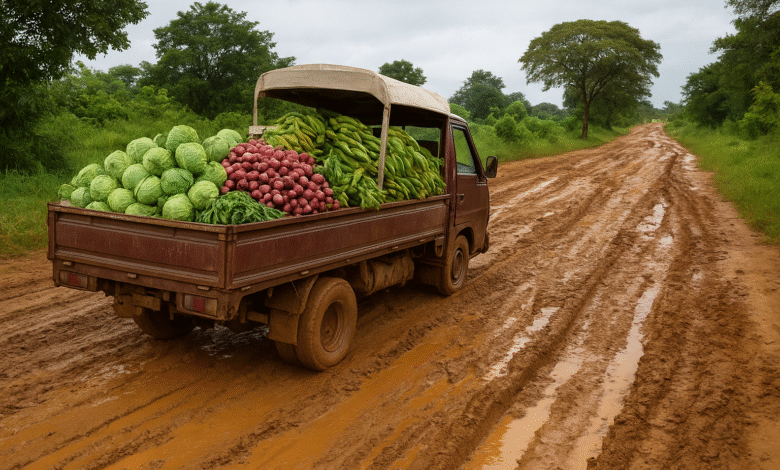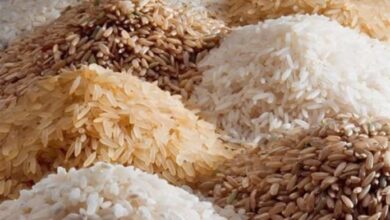Bad Roads, High Prices: Vegetable Exporters Say New Budget Road Plan Could Ease Food Inflation

Ghana’s stubbornly high food prices could finally ease if government follows through on its plan to upgrade agricultural enclave roads, according to the President of the Vegetable Producers and Exporters Association of Ghana, Dr Felix Mawuli Kamassah.

In an interview with ghnewshub.com, Dr Kamassah described the 2026 Budget’s emphasis on feeder roads in food-producing communities as the most impactful intervention for the agricultural sector. He said poor road conditions remain one of the biggest and least-discussed drivers of food inflation, pushing farmers to transfer escalating transport costs directly to consumers.
He cautioned that until roads improve in rural food baskets, market prices will remain elevated even in seasons of abundant harvest.
How Poor Roads Drive Up Food Prices
Dr Kamassah noted that much of the country’s vegetables and staples come from remote communities with severely deteriorated road networks. Farmers must rely on tricycles and motor carts to move produce to the nearest accessible point, often at high cost due to the rough terrain.
“By the time the aboboyaa moves plantain or vegetables to the roadside, the cost has doubled,” he said. “Drivers avoid getting close to the farms because the roads are too bad. Farmers pay more, and to avoid losses, they pass that cost straight to the consumer.”
These cumulative costs, he explained, eventually show up in retail markets in Accra, Kumasi and other cities.

Budget 2026 Targets Roads That Feed the Nation
Finance Minister Dr Cassiel Ato Forson identified poor feeder roads as a major contributor to food inflation and announced a three-year programme to construct one thousand kilometres of agricultural enclave roads.
The Department of Feeder Roads will focus on routes that link directly to farming zones to reduce transport costs, minimise post-harvest losses and improve food movement nationwide.
For Dr Kamassah, this shift is significant.
“If government completes these roads, food prices will go down. Transporters will charge less and farmers will finally get fair value,” he said. He added that VePEAG is monitoring some of the priority roads listed in the budget and is hopeful the timelines will be met.
Mechanisation: A Race Against Time
Dr Kamassah also welcomed the budget’s plan to supply agricultural machinery to fifty districts under Farmer Service Centres, with over four thousand machines expected.
He stressed that timely access to tractors and mechanisation services is critical for farmers.
“When farmers do not get machines early in the season, they lose both time and money. The equipment promised must arrive early and be delivered on schedule,” he said.
Delays in mechanisation reduce yields and increase production costs, feeding directly into higher food prices.
Irrigation: A Safety Net in a Changing Climate
The VePEAG President described irrigation as essential to stabilising production, especially as rainfall becomes increasingly unreliable.
The budget commits to rehabilitating existing irrigation sites and scaling up infrastructure under the Ghana Irrigation Development Authority.
“If we irrigate the land we already have, production will rise and food prices will fall. We cannot depend on rain-fed farming anymore,” he said, noting that many GIDA sites only need rehabilitation to become productive again.
Export Competitiveness Depends on Local Efficiency
As head of a major export association, Dr Kamassah said more reliable production and lower logistics costs will strengthen Ghana’s position in international fresh-vegetable markets.
“Fixing roads and irrigation gives farmers stability. If production costs fall, we become more competitive internationally as well,” he said.
Food Prices and Ghana’s Inflation Challenge
Food inflation continues to weigh heavily on Ghana’s cost of living. Analysts have long argued that poor feeder roads, inefficient logistics and post-harvest losses are as responsible for high food prices as weather shocks or input shortages.
Dr Kamassah’s message echoes that reality: inflation often begins where the good roads end.
With new commitments to roads, machinery and irrigation, VePEAG believes the 2026 Budget has the right focus. But Dr Kamassah emphasised that execution will determine success.
“We are happy with the budget,” he said. “But what matters is that the roads, the machines and the irrigation facilities are built on time. That is what will truly reduce food prices for the ordinary Ghanaian.”



